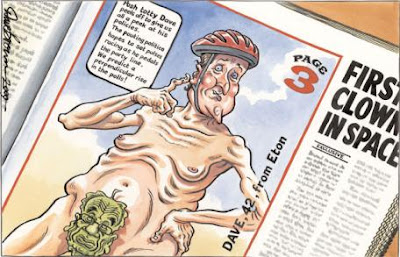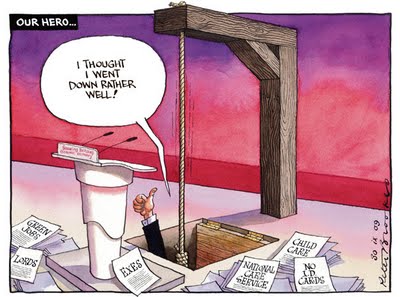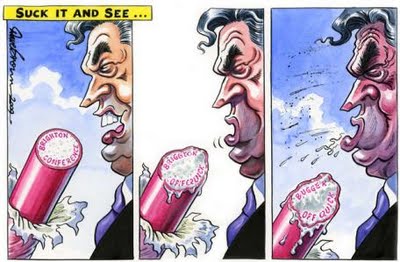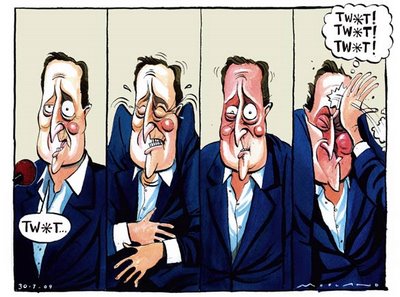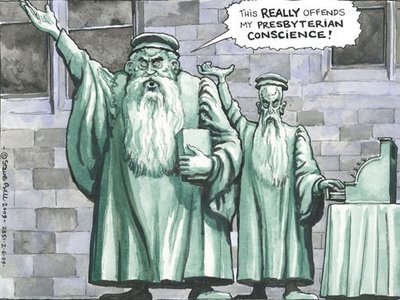The party's over.
Reading Dave Osler's survey of the potential for a far-left breakthrough at the general election is to re-read the annals of socialist sect history over more or less the last 20 years. Without placing the blame at any particular grouping, the failures are obvious: a complete inability to work together when only an alliance could so much as begin to threaten the Labour party, a shocking lack of leadership material, and that which there is tends to be egotistical and controlling beyond belief, an obsession with fighting yesterday's battles while ignoring the changing nature of modern British society, and most importantly of all, thinking that the electorate will connect with you rather than you having to connect with them.
The spectre which once only haunted the socialist left is now hanging over the left as a whole. The left has just failed to take the greatest opportunity to be handed to it in a generation: a crash which many predicted but which it has been unable to take advantage of. Even as governments turned to Keynes, the left's response has been either muted or non-existent. Just when an alternative has been most needed, as those who have never experienced a recession have had to get used to the feeling of being surplus to requirements, the explanation for why this cycle is doomed to repeat has been almost wholly lacking. Left economists may have been those whose advice has been turned to, but no grouping has built upon this to turn it into a critique of where we went wrong and what has to be changed to even limit the effects should it happen again.
Undoubtedly we can put some of the blame upon a Labour party which has never looked so moribund. It seems determined to spend its few remaining days in power, when not sulking about still being lead by Gordon Brown, showing the poverty of thinking which has condemned it to its current position. All it offers now is the chance for you to keep up with the Joneses, the shallowest, most limited vision of aspiration imaginable. This isn't just down to Brown's intellectual inadequacy when he moves off economics, failing to articulate the "good society" which Blair in flashes painted in his famous verb-less speeches. It's a direct result of Labour's obsession with the dead centre, the triangulation which inhibits its every statement.
Who though is waiting for their chance to prove they could do better? Alan Johnson? One of the Miliband brothers? Harriet Harman? Peter Mandelson? Every single one is dedicated to the continuation of the current policies, with slight changes at the edges. This is the biggest problem facing not just Labour, but the left at large: there are no new potential leaders waiting for their opportunity, rather just the same old bunch of either politicos, trade union dinosaurs or uninspiring if competent incumbents.
Take, just as an example, the "Progressive London" conference being held this weekend. Not content with continuing to use the word "progressive" as if it still means something, it's Ken Livingstone also failing to realise that despite all he's done, for which he deserves praise, he's now yesterday's man and ought to put his dreams of returning to the Mayorship behind him. Look at the panel on "the cost of war" and try not to either smash your monitor or throw up on it: what can Galloway, the political editor of the fucking Morning Star, CND and the Stop the War Coalition say which they haven't already and which hasn't already driven away those who once protested? To take one gathering which isn't completely shooting fish in a barrel, there's Stopping the BNP - no concession to the far right, which features such luminaries as that guy out of that band which made that "Heavyweight Champion of the World" song, alongside an union regional secretary and someone from Love Music Hate Racism. When perhaps discussion on why people vote for the BNP should be foremost in the minds of the left, and how to win back supporters that have crossed the political divides, the first people I know I'd turn to would be someone from a good cause which everyone can get behind but which changes nothing and a guy who's made one hit record. There are a couple of promising panels, such as the one on electoral reform and homes and planning for London's future, something which is actually practical, but the rest is the left banging on about the same old things without ever moving forward, which, unless I'm much mistaken, is what progressive is actually meant to mean.
Even if the left and the Labour party separated some time ago, the massive victories of 97 and 2001 resulted in a lengthy period in which minds went unfocused and everyone pretended that much was fine. Since then it has, quite reasonably, focused on foreign affairs but in doing so allowed domestic politics to rot away. The biggest indictment of the left, if over anything, has been the continuing rise of the BNP, and through its refusal, both to even countenance debating the organisation but also in accepting the new orthodoxy that immigration was fine before but it is out of control now and needs to be tackled. The response at this year's European elections to the biggest far-right electoral threat of modern times? To split the vote away from the Greens, with Bob Crow's hopeless and reactionary No2EU organisation and the 80s throwbacks the Socialist Labour Party both on the ballot alongside all the other non-entities. Just when it needed to come together to fight the greater enemy it fractured just as it has in the past.
Where does the left go from here? The best case scenario is that it gets the rude awakening of its life come 6th of May; although a Conservative majority of the size of Labour's first and second terms thankfully seems unlikely, a victory which is large enough to concentrate thinking is the best possible outcome. It doesn't just need to rebuild; it needs to examine whether it has to demolish and start again. The party's over, and whether it starts again depends entirely on the reaction in the coming months. If, as Chris so accurately describes the prospect, of a government run by the children of the rich for the children of the rich doesn't reanimate the corpse of a dying ideological bent, nothing will.
Labels: death of Labour, our new overlords, politics, the far left, the new Tories, where do we go from here
